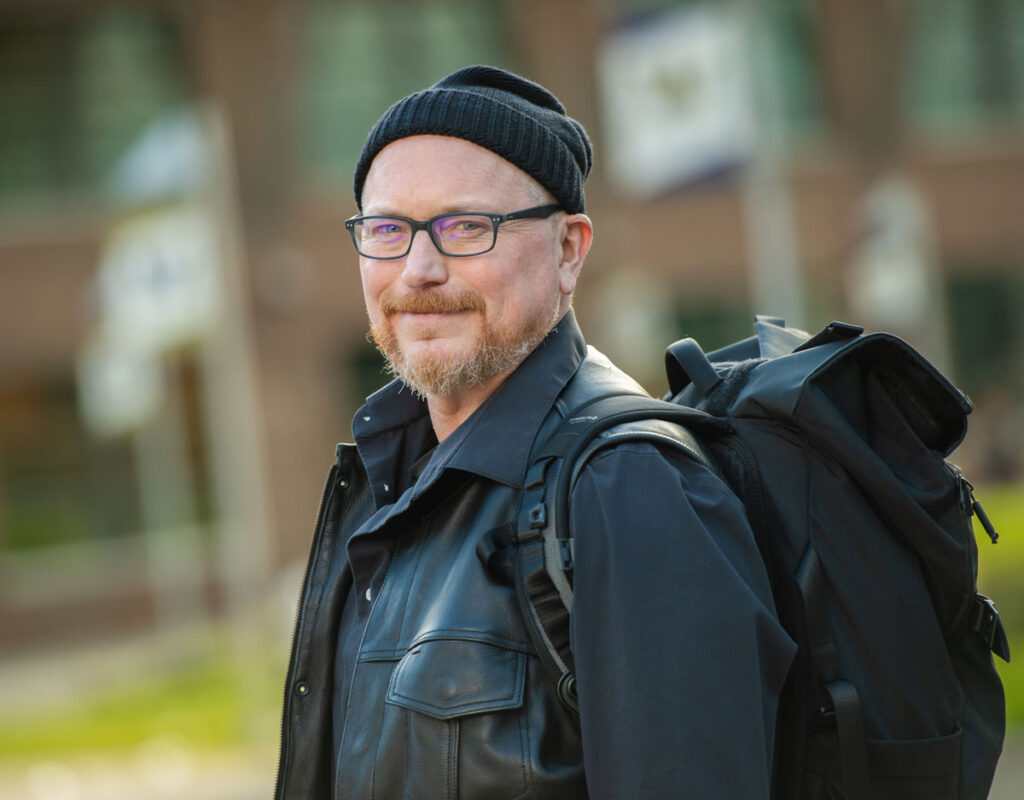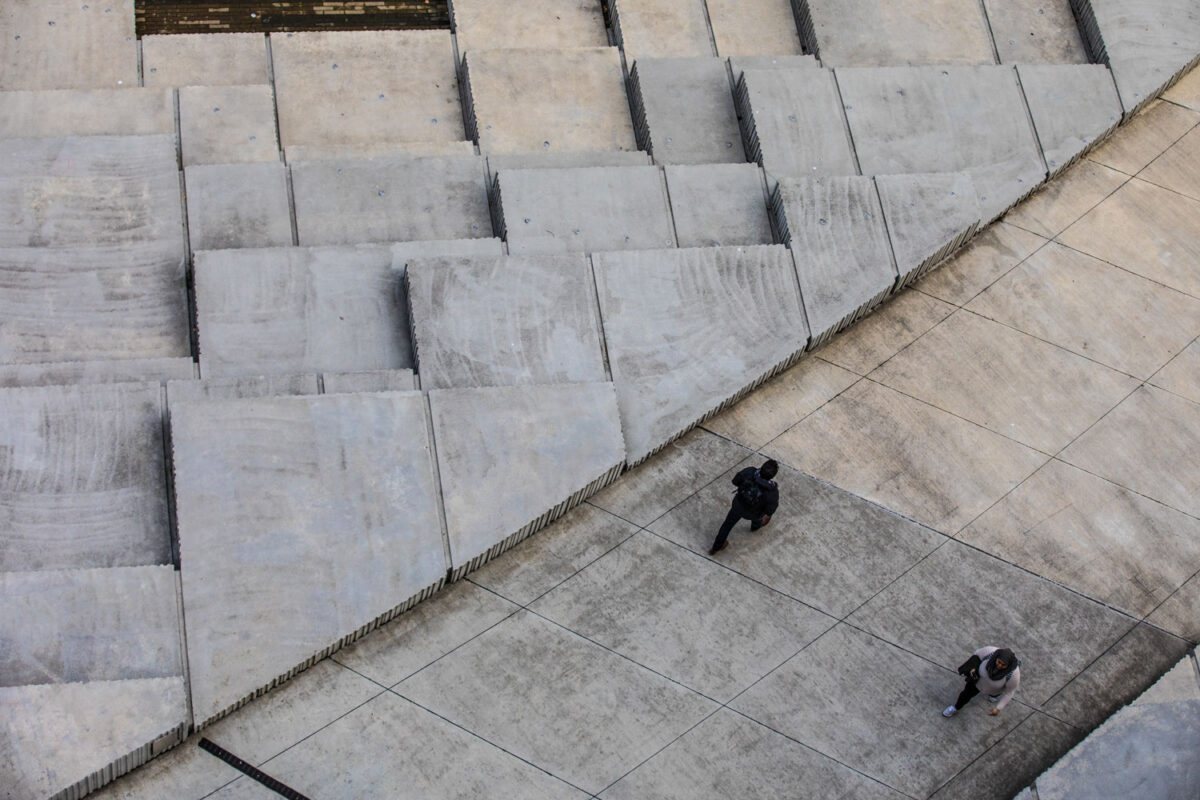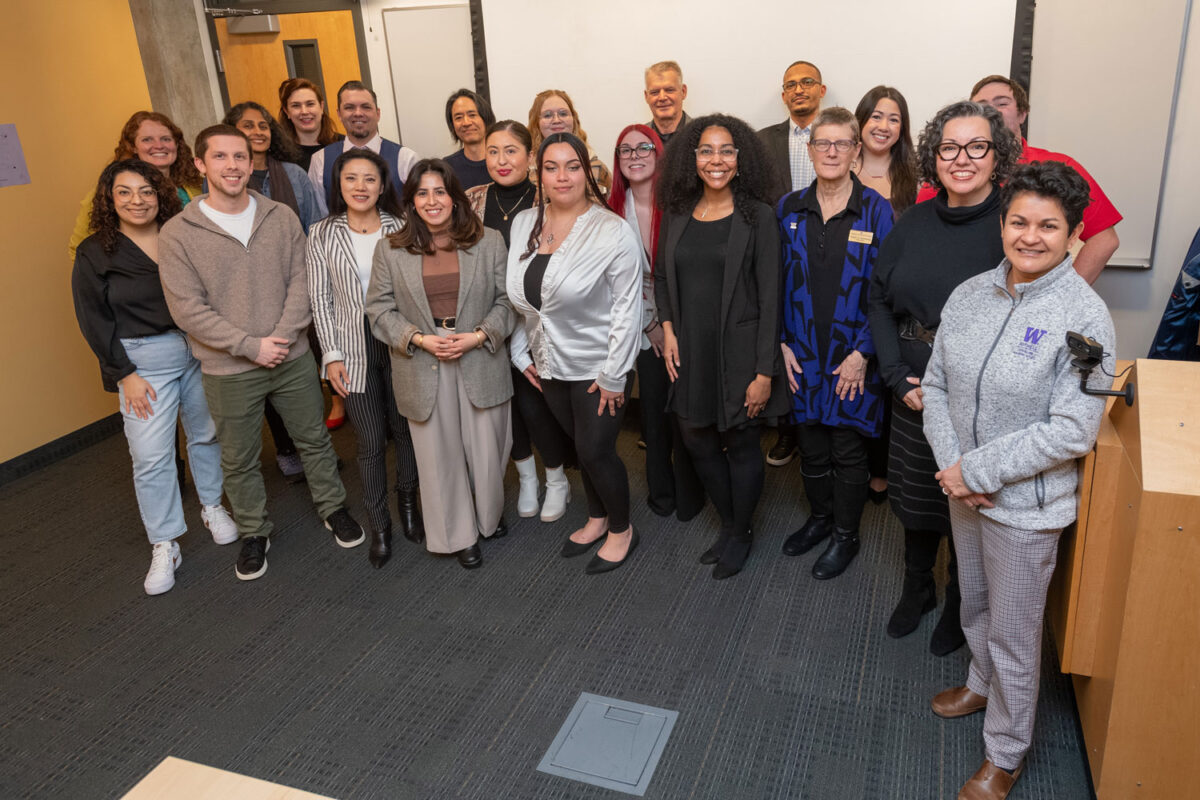Walking, as a topic, may at first glance seem fairly straightforward. But as students who take the University of Washington Bothell course, “The Art & Politics of Walking,” discover, there’s a lot more to it than the simple act of putting one foot in front of the other.
“My biggest takeaway from this class is that walking has so many layers to it, from speed to length to how many steps you take,” said first-year student Daniel Kim. “These layers all contribute to your personality, your current emotions and even the environment around you.”
This course, taught by Dr. Jason Lambacher, is part of the First Year & Pre-Major Program’s Discovery Core Experience, a selection of courses that cross disciplinary boundaries and offer new perspectives and opportunities for reflection — plus a chance for students to explore possible majors and topics of interest.
For Lambacher, the DCX is a welcome outlet for experimentation and creativity. “I love being here at UW Bothell, where there’s a focus on interdisciplinary learning,” he said. “As an environmental political theorist, I think that’s really important. It’s helped my teaching to have that opportunity to teach a wide range of courses.”
In his latest DCX offerings, the lecturer in the School of Interdisciplinary Arts & Sciences examines the topics of both walking and comedy through the lens of art and politics.
Beyond the sole
In the first half of the quarter, students in the walking class learned about the activity as an art and a practice, as well as its physical and emotional health benefits. Walking can also be a social act and even a spiritual one, Lambacher noted, seen across the world in the form of pilgrimages.
“Walking is so important for health but also important for slowing down in this really sped up society,” he said.
For Bronson Kim, a first-year pre-major who plans to major in Biology, learning about the mental health benefits was especially valuable, as he plans to become a psychiatrist.
“Walking is something that we do every day, and sometimes I feel that we take walking for granted,” Kim said. “Psychiatry requires empathy, mindfulness and the ability to be present with others. Through this class, I’ve learned that all of this can be done through the practice of mindful walking. This course helped me better understand the relationship between physical movement, mental health and emotional well-being.”
For the second half of the quarter, students focused on the social and political aspects of walking — from the act of protesting by marching to the way issues around race, class and gender can be explored through walking.
Throughout the course, students were asked to keep walking journals and to do at least one 30-minute walk each week. In other assignments, they did walking audits of their neighborhoods to consider how accessible they were, both for those on foot and for those traveling by a wheelchair or other aid. They also examined “walk scores,” commonly used in real estate, for their relationship to the socioeconomic status of a neighborhood and examples of urban design that successfully improved walkability. In partnership with the city of Kenmore, they also created a geocaching project.
“It’s something that can divide us, but it can also unite us if we have better public policy that allows for more walkability throughout the whole community and not just in wealthier areas,” Lambacher said.
“This class helped me explore new areas that I haven’t explored before. It helped me get outside more, get outside of my comfort zone and expand on myself to grow as a person.”
Ashton Lappier, junior pre-major
Behind the laughter
In spring 2024, Lambacher added another DCX class to his repository: “The Art & Politics of Comedy.” The course explores the role of comedy as an art form and as a force for social and political commentary. He had previously incorporated the topic of political comedy and satire as a lighthearted end to his American Government courses, and the idea to do a class on comedy grew from that.
He started the class by sharing with students a number of historic examples of comedy in art, literature and folk traditions, including roles such as jesters, satirists and critics.
“Comedy was often thought of as a tool of the strong to put down the weak,” he said. “Today, that’s often flipped around, and so we take a look at the ethics of punching down versus punching up, which I think is really fascinating.”
As a political scientist, Lambacher said he’s especially interested in the role comedy plays in a democracy versus the dangers of practicing comedy in authoritarian countries and dictatorships. Quoting the author Arthur Koestler, he said, “Dictators fear laughter more than bombs.”
Students in the course also looked at more recent history, including mid-20th century political comedy in America and the emergence of stand-up, late night TV, sketch comedy and meme culture. Through a connection with the Everett Comedy Night, Lambacher also hosted local comedian Cory Michaelis in class.
“Comedy gave me a great opportunity to take a step back from a difficult quarter and learn something more in line with my personal interests,” said Jackson Delles, a junior majoring in Data Visualization. “The deep look into the history of comedy and how its surge in popularity and accessibility has influenced national policy and everyday speech was fascinating.
“I left the class recognizing the importance of free speech and where it begins and ends, especially in terms of entertainment. In an age where everyone has access to platforms to quickly get famous, knowing the art of comedy and the curation of a well-made joke helps separate the hacks from the geniuses.”
Sharing the experience
In both of Lambacher’s DCX courses, themes of crossing disciplines, cultures and even personal divides abound. His aim is not to leave students with any one specific piece of information but rather foster in them an appreciation for the discussion and reflection that a topic can inspire.

This outlook, he said, stems from his passion for philosophy. He did his undergraduate degree in political philosophy and often includes the topic in his curriculum.
“To take an idea like walking or comedy and look at it from a different perspective — both in terms of theory and practice — is a great way to inspire and communicate a passion for learning to the students that will hopefully follow them throughout their academic journey,” Lambacher said.
He also encourages his students to be intentional about finding community on campus by joining a club or other group. Recently, he found himself emboldened to take his own advice when the opportunity to facilitate a philosophy club presented itself.
Folio: The Seattle Athenaeum is a nonprofit membership library located in the heart of Pike Place Market. The Folio Philosophy Club there had previously been run by a retired moral philosopher, but the club had ceased meeting during the pandemic and never returned. When Lambacher expressed his interest in the topic, it seemed like the perfect opportunity to revive it.
Using a book he’d previously lectured on, “The Socrates Express” by Eric Weiner, as a guide, Lambacher now leads a monthly discussion around philosophy for the 15 to 20 attendees who join. Each meeting explores the question, “What does it mean to live a good life?” and is centered around a specific life lesson and a historic philosopher.
“This club is structured around life lessons that come from experience,” he said. “People share ideas and explore them critically but also then apply them to their own life and what they’ve learned and what they want to pass down. That to me is really gratifying.”
Passing it on
“It’s not just intellectual, but it’s applied philosophy in the way that we apply it to our lives to learn how to be a better person, how to overcome adversity, how to deal with difficult times,” Lambacher said. “People have some great experiences to pass on, and I love sharing those with others.”
Just as Lambacher has found community in his philosophy club, he hopes that his classes offer UW Bothell students new opportunities for connection, whether through the cathartic experience of collective laughter or a walk with a friend.
One of the things that touched him most about the walking journal entries, he added, was the personal connections that many of the students had with their families when the assignment gave them permission to step away from their work, put down their phone and engage with the present moment.
Said Ashton Lappier, a junior pre-major, “I found that there was more to walking than meets the eye. Walking is far more than just walking; it is the ability to explore oneself freely without following a path.
“This class helped me explore new areas that I haven’t explored before. It helped me get outside more, get outside of my comfort zone and expand on myself to grow as a person.”




